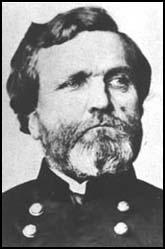George Thomas

George Henry Thomas was born in Southampton, Virginia, on 31st July, 1816. He studied at the U.S. Military Academy at West Point and after graduating in 1840 joined the United States Army. He fought in the Seminole War and won two brevets in the Mexican War (1846-48).
Thomas taught at West Point before joining the 2nd Cavalry where he served as a major under Albert S. Johnson and Robert E. Lee. Badly wounded in the face by an arrow in November, 1860, Thomas was off duty for over a year.
Although a Southerner, Thomas joined the Union Army on the outbreak of the American Civil War. Commissioned as a brigadier general, Thomas was sent to Kentucky where he won the battle of Mill Springs (January, 1862). He served under Don Carlos Buell and William Rosecrans where he took part in the battle of Stones River (January, 1863).
William Rosecrans made a serious tactical blunder at Chickamauga (September, 1863) where he opened up a gap in the Union Army lines. Rosecrans and his men fled to Chattanooga, but Thomas held his position and emerged from the battle with much credit. He was immediately promoted to brigadier general and succeeded Rosecrans as commander of the Army of Cumberland.
Thomas joined William Sherman in the task of destroying the Confederate Army in Tennessee. Joseph E. Johnston and his army retreated and after some brief skirmishes the two sides fought at Resaca (14th May), Adairsvile (17th May), New Hope Church (25th May), Kennesaw Mountain (27th June) and Marietta (2nd July).
President Jefferson Davis was unhappy about Johnson's withdrawal policy and on 17th July replaced him with the more aggressive John Hood. He immediately went on the attack and hit Thomas and his men at Peachtree Creek. Hood was badly beaten and lost 2,500 men. Two days later Hood took on William Sherman at the Battle of Atlanta and lost another 8,000 men.
John Hood continued to adopt an aggressive policy in Tennessee and despite heavy losses surrounded Thomas at Nashville. On 15th December, 1864, Thomas broke out of Nashville and hammered Hood's army. Thomas captured 4,462 soldiers and those still left alive fled into Mississippi and Alabama. The Confederate Army in Tennessee had now been completely destroyed.
On 16th January, 1865, Thomas was promoted to the rank of major general and became commander of the Department of Tennessee. In 1869 George Henry Thomas moved to the Department of the Pacific and he died in office after suffering a stroke in San Francisco on 28th March, 1870.
Primary Sources
(1) Ulysses Grant, Personal Memoirs of U. S. Grant (1885)
I had been at West point with Henry Thomas and had known him later in the old army. He was a man of commanding appearance, slow and deliberate in speech and action; sensible, honest and brave. He possessed valuable soldierly qualities in an eminent degree. He gained the confidence of all who served under him, and almost their love. This implies a very valuable quality. It is a quality which calls out the most efficient services of the troops serving under the commander possessing it.
(2) Henry Villard met George Thomas in 1863. He wrote about the man in his autobiography, Memoirs: Journalist and Financier (1904)
Though a native of Virginia, he had never faltered for a moment in his fealty to the flag. He had a commanding presence, being nearly six feet high, and a soldier-like, erect bearing, with an open countenance, but rather a stern expression, full light-brown hair and beard tinged with grey. On first acquaintance, he seemed of a solid nature and stiff and distant in manner, but on closer intercourse would reveal himself as a sturdy, resolute character, with the strongest sense of duty, and, altogether, a thorough soldier. He was not a genius, but was very intelligent, and although he seemed at times not quick in perception and too deliberate in execution, he could always be relied on to do what was required of him to the best of his ability.

